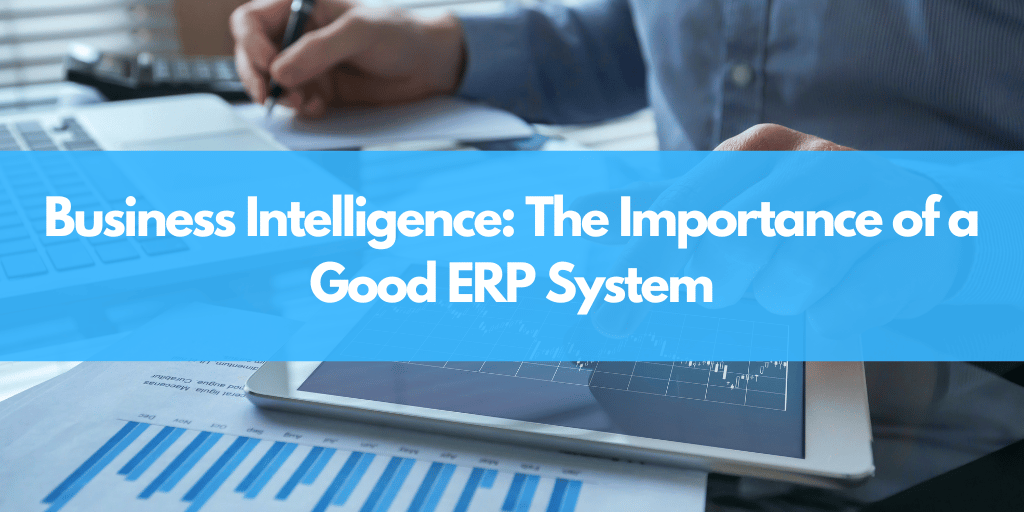
Business Intelligence: The Importance of a Good ERP System
Think of business intelligence and you’re likely to think of spy thrillers, awkward elevator encounters and suspicious colleagues. However, when it comes to business and your company’s operations, it means something very different. Business Intelligence (BI) is a department or software that enables businesses to analyse their data quickly and effectively to help them understand the performance of their organisation more deeply. An effective business intelligence system help your company monitor its performance against set targets, identify any red flags sooner, and take actions in response faster. A good ERP system will include features that support BI. let’s take a look at why this is important for your company.
What is an ERP system?
An enterprise resource planning (ERP) system is an IT solution that integrates company-wide data and operations, such as finance and HR, to improve business performance. The system typically includes a database and software, either on-premise or in the cloud. It allows users across the organisation to access data from a central network and to work with it collaboratively. The first applications used in ERP systems were financial. In the 1960s, large organisations, such as car manufacturers, needed to bring together various data systems to perform cross-departmental accounting tasks. By the 1980s, ERP systems had become commonplace in large organisations. They have since become integral to most modern businesses.
Why is business intelligence important?
Business intelligence is critical to organisations of all sizes, from small businesses with a handful of employees to multinational corporations with tens of thousands of staff. Without the ability to understand their business, these organisations cannot identify weaknesses and opportunities, formulate strategies, or make informed decisions. There are three key reasons why having a good business intelligence system is important:
- Understanding your customers
To be successful, your company must understand who its customers are and what they want. BI enables you to create customer personas and customer journey maps to help you do this. This knowledge helps you to crate better products, improve customer service, and identify your best customers. - Understanding your market
Your business doesn’t exist in a vacuum. It exists in a marketplace with other organisations, both competing and collaborating with them. BI helps you to understand your market by providing information about your competitors, including market share and profitability. - Better decision making
Every decision your company makes has an impact on the overall performance of the organisation. The better you understand your business, the more informed your decisions will be. BI helps to inform decision-makers by providing them with data and insights about the organisation’s performance.
Why is a good ERP system important?
If business intelligence helps organisations understand their business, then a good ERP system is what makes that happen. The good news is that, as the name suggests, a good ERP system will support your business intelligence efforts. Having a good ERP system enables you to better manage your business, including supply chain management and inventory management. This is important because it’s these core operations that drive your company. They determine how quickly your organisation can respond to customer requests and deliver products on time. A good ERP system will bring together key data from across your company in a centralised database. This helps you to understand your entire operation in one place, which is important when you’re trying to identify weaknesses and opportunities. A good ERP will also be easy to use, have the necessary features. and be scalable.
3 Signs that indicate you need to upgrade your ERP system
If you’re using a business intelligence system, then you’re already investing in your business. However, if you’re using an old system, you’re not getting the full return on investment (ROI) that you could be getting. There are a few signs that indicate you many need to upgrade your system:
- Growing pains
If your organisation has grown significantly since you implemented your system, it’s possible it’s no longer able to handle the data volume. If your system is having difficulty handling the amount of data your organisation generates, it will struggle to deliver the insights your business needs. You may find that your reports are taking longer to generate and are less accurate. - Security issues
If something goes wrong in your system, it has the potential to bring the whole thing down. An outage in a centralised system can affect your entire organisation. Similarly, if your system is out of date, it may not be able to protect your company from cyber threats. A good system will include built-in security features and be updated regularly. - Technology issues
You’re using a system that’s years out of date. The system is difficult to use, which means you have to train your staff on it. This could be compromising their productivity and effectiveness. It’s also difficult to scale as the company grows.
Conclusion
Business intelligence is more than just a department or software; it’s an organisation-wide culture that requires commitment and collaboration from all employees. Having a good ERP system will help you to implement this culture by bringing together key data across your organisation and making it accessible to all employees. However, having a good ERP system isn’t enough. You need to understand what your business intelligence system does and why it’s important for your company. Business intelligence is about more than just generating reports and charts; it’s about helping your company succeed!



